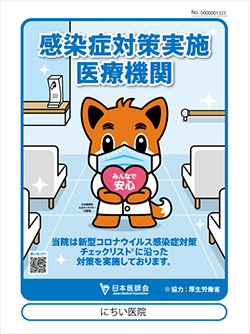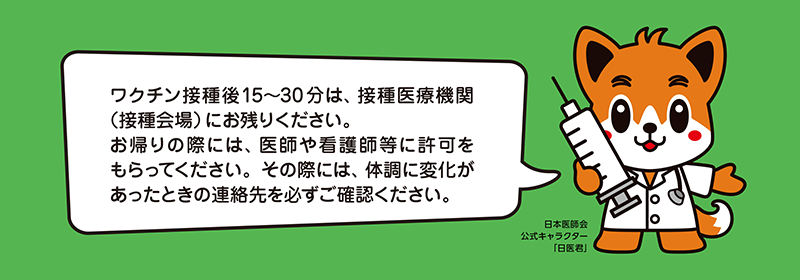December 9, 2022
For Correct Understanding of Novel Coronavirus Infection (Vaccination, etc.) [Message from the Japan Medical Association to the Public]
- Japan Medical Association Official YouTube
- In order to receive vaccinations for new coronavirus infections with peace of mind
- To those who have made a reservation for the new corona vaccination
- Information provided by the government on new coronavirus vaccines
- Related Links
- Everyone's safety mark
- Request for donation
- Infection prevention-related link of citizen
This video is for the purpose of calling for early vaccination in response to the fact that vaccination against the Omicron strain (BA.1) has started and there is concern about the simultaneous epidemic of corona and influenza this winter. I made it. In the video, Executive Director Satoshi Kamasaki, who is in charge of infectious disease crisis management and vaccination at the Japan Medical Association, answers questions from the official mascot of the Japan Medical Association, "Nichii-kun". 1) Effectiveness of corresponding vaccines, Is it possible to vaccinate against coronavirus and influenza at the same time?
- Ministry of Health, Labor and Welfare special website "Response to simultaneous epidemics of new coronavirus and seasonal influenza"
- Leaflet "Prepare vaccinations, new corona antigen qualitative test kits, and antipyretic analgesics this winter"
- Leaflet "For those who are at high risk of developing severe symptoms of the new coronavirus, and those who are at low risk of developing severe symptoms of the new coronavirus"
- Leaflet "To everyone who has not yet completed the third vaccination of the new corona vaccine" (July 2022)
- Leaflet "What I want to tell you about the corona vaccine now (to promote the third vaccination of the younger generation)" (July 2022)
- Leaflet "Notice of new corona vaccination for high school students and university students (please consider the third vaccination)" (April 2022)
- Leaflet "What you want everyone to know about the new corona vaccine-additional (3rd) vaccination-" (January 2022)
- Leaflet "Notice about vaccines used for additional (third) vaccination" (Revised in January 2022)
- Message video (Minister Horiuchi) "Vaccine Minister answers questions"
- Message video (Prime Minister Kishida) "Message on the third vaccination"
- Government public relations TV commercial "Necessity of booster vaccination"
- Government publicity TV commercial "Vaccine booster 2"
- Video message from Minister of State for Vaccines Horiuchi and former Minister of State for Vaccines Kono
- Japan Medical Association
- Notification of new corona vaccination (for those aged 65 and over) [Ministry of Health, Labor and Welfare]
- "Kokoro no Mimi" [Ministry of Health, Labor and Welfare]
- Let's protect Japanese medical care and medical workers fighting the new coronavirus [Association of volunteer experts on new coronavirus infections]
- Good medical care. Jp [Ministry of Health, Labor and Welfare official website]
Medical institution implementing measures to prevent infection such as new coronavirus infectious disease Everyone's peace of mind mark
-
Everyone's safety mark

With the spread of the new coronavirus, medical institutions are working more than ever to prevent infection, but those who have been to the hospital or who have become ill due to a major change in their lifestyle are at increased risk of infection. There is a current situation where people are afraid to refrain from visiting a medical institution or postpone it.
In addition, there are many people who are worried about their children's infection and refrain from vaccinations or cancel health checkups.
If this situation continues, it will hinder the early detection and prevention of diseases, which are the strengths of Japanese medical care, and could have a serious impact on the health of the public.
In light of this situation, the Japan Medical Association has issued a “Medical Service for Preventing Infection Prevention against Novel Coronavirus Infections, etc.” to medical institutions that are thoroughly implementing infection prevention measures so that patients can visit medical institutions with peace of mind. We have decided to issue the Institution Everyone's Peace of Mind Mark.
This mark will be issued when the medical institution answers that it has implemented all the items of the infection prevention self-checklist.
A list of medical institutions that have issued this mark can be found below.
List of medical institutions issuing the “Safety Mark for Everyone”【9.8MB】
(2020/8/7-2022/11/30) Updated December 9, 2022
- Infection Prevention for Citizens Basic knowledge of infection prevention The University of Tokyo Disaster Response Training Center (lecture) [youtube]
- Infection Prevention for Citizens Basic Knowledge on Infection Prevention The University of Tokyo's Disaster Response Training Center (Demonstration Edition)

For the latest information on the new corona vaccine, please visit the government homepage.
Ministry of Health, Labor and Welfare: "New Corona Vaccine Q&A"
Ministry of Health, Labor and Welfare: "About the new corona vaccine"
Prime Minister's Office: "About the new corona vaccine"
- Q1. Why vaccinate?
- A. Vaccination has been shown to prevent symptoms from appearing and to prevent the disease from becoming severe. Recent studies have also shown that it may be possible to prevent the infection itself.
- Q2. Should I be vaccinated?
- A. Vaccination of as many people as possible can prevent the spread of infection. Immunization has two roles: to protect individuals and to protect society.
- Q3. How effective is the vaccine I give you?
- A. When two doses were given three weeks apart, the effect of preventing symptoms was about 95% 7 days after the second dose. The effect of vaccination in a prescribed manner (interval, number of times) is scientifically clear.
- Q4. How do you vaccinate?
- A. Inject into the upper arm muscle. In the case of “Cominati Intramuscular Injection” (Pfizer), it is performed twice at an interval of 3 weeks.
- Q5. Why is the new coronavirus vaccine an intramuscular injection?
- A. Vaccines are absorbed more quickly by intramuscular injection. Muscles have abundant blood flow and many immune-related cells, so it is easy to acquire immunity from vaccines.
- Q6. Doesn't intramuscular injection hurt?
- A. There are individual differences in how pain is felt. It also depends on the ingredients in the vaccine. Swelling and pain at the injection site may occur some time after the injection.
- Q7. Are there any precautions for vaccination?
- A. Care should be taken if you are prone to bleeding due to the effects of the medicines you are taking, or if you have a disease that causes bleeding easily. If you are taking any medications or undergoing medical treatment, please check with your doctor beforehand. And be sure to tell your doctor or nurse before getting vaccinated.
- Q8. Should I get the vaccine if I am pregnant or breastfeeding?
- A. You are not exempt from vaccination, but you should always consult with your doctor before getting vaccinated.
- Q9. Can children be vaccinated too?
- A. yes. As of February 2022, those who are 12 years old or older on the day of vaccination are eligible for the first (1st and 2nd) vaccination. For this reason, people under the age of 12 are not eligible for the new corona vaccine. Currently, both the Pfizer vaccine and the Takeda/Moderna vaccine are intended for people aged 12 and over.
In addition, the target people for vaccination are determined based on the current scientific knowledge, and it is possible that the target age group for vaccination will expand in the future in Japan as well. Please check the Ministry of Health, Labor and Welfare website for the latest information. - Q10. If I have an allergy, is it safe to get vaccinated?
- A. There are many different causes of allergies. If you suspect a specific cause, talk to your doctor beforehand about its relationship to the ingredients in the vaccine. If you are allergic to ingredients other than those included in the vaccine, you can be vaccinated.
- Q11. What if I have a history of severe allergies?
- A. First, consult your family doctor. In addition, please be sure to tell your doctor or nurse before vaccination so that the doctor, etc. who administers the vaccine will observe it carefully and respond promptly if necessary.
- Q12. I am worried about changes in my physical condition after vaccination.
- A. After inoculation, about 15 to 30 minutes will be observed at the inoculation facility. Dizziness, nausea, and a drop in blood pressure may occur immediately after vaccination. On the day after the injection, you may experience pain/swelling at the injection site, muscle or joint pain, headache, fatigue, fever, etc. These usually subside within a few days. If you have any concerns about changes in your physical condition, please consult with the medical institution where you received the vaccination or the local government office.
- Q13. What is anaphylaxis?
- A. Anaphylaxis is a systemic allergic reaction that occurs within a short period of time after a drug or food enters the body. Symptoms include itching, hives, breathlessness, and abdominal pain that affect two or more organs. A sudden drop in blood pressure and loss of consciousness is called anaphylactic shock. These should be treated immediately.
- Q14. When can anaphylaxis occur after vaccination?
- A. According to reports from the United States, 90% of those who had anaphylaxis had symptoms within 30 minutes after vaccination. Facilities that administer vaccinations have systems in place to ensure that appropriate responses are taken.
- Q15. Who should I contact if I notice a change in my physical condition after leaving the vaccination facility?
- A. Rest and contact the medical institution where you received the vaccination or the consultation desk listed in the guidance from the prefecture or municipality.
To those who have made a reservation for the new corona vaccine Before receiving the vaccine -Vaccine and side effects-
- Depending on the person's physical condition and predisposition, there are times when an "allergic reaction" is caused by something (eg, food, medicine, etc.) that enters the body from the outside. Similarly, vaccines may cause side effects such as allergic reactions, although they are not frequent. However, it is extremely rare for serious symptoms to occur with accurate medical interviews before vaccination and proper treatment in the unlikely event that a side reaction occurs.
- ◆Before vaccination, we will check whether you have a fever, whether you have chronic diseases such as heart disease or kidney disease, and whether you have a history of allergies due to vaccination. Be sure to tell your doctor if any apply to you.
- ◆Be careful of your physical condition after vaccination (immediately after and for several days). If you have any changes or abnormalities in your physical condition, consult with the medical institution where you received the vaccination or the contact information provided in advance and ask for instructions.
-
[Symptoms that may occur]
● Swelling and pain at the injection site ⇒ Appears on the day and lasts for about 2 days
● Muscle pain, joint pain ⇒ Most appear the day after vaccination and subside in about a day
● Headache ⇒ Most appear the day after vaccination and subside in about a day
● Malaise, chills, fever ⇒ Most appear the day after vaccination and subside in about a day
! If you experience any of the above symptoms and do not get better in a few days, see your doctor. -
[Anaphylaxis]
Less common symptoms include:
● Skin itching, hives, skin redness
● Sneezing, itchy throat, hoarseness, shortness of breath
● Abdominal pain, nausea
● Difficulty seeing things
● Bad mood, etc.
! If you experience any of these symptoms within 30 minutes after vaccination, immediately tell the doctor or nurse who gave you the vaccination.

